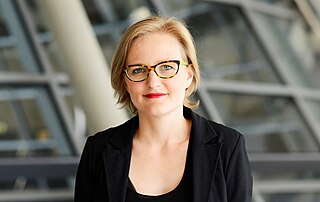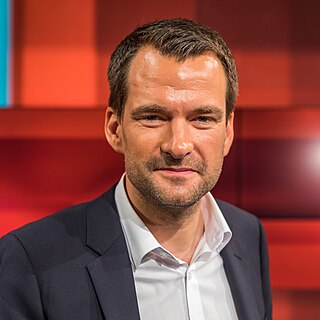
Claudia Benedikta Roth is a German politician. She was one of the two party chairs from 2004 to 2013 and previously served as one of the vice presidents of the Bundestag. She is currently serving as Federal Government Commissioner for Culture and the Media in the government of Chancellor Olaf Scholz since 2021.

Herta Däubler-Gmelin is a German lawyer, academic and politician of the Social Democratic Party. She served as Federal Minister of Justice from 1998 to 2002, and as a Member of the Bundestag from 1972 to 2009. She currently teaches as an honorary professor of political science at the Free University of Berlin, particularly on international relations and human rights, and was the Hemmerle Professor at RWTH Aachen University in 2011. She is married to the legal scholar Wolfgang Däubler.

Alfred-Maurice de Zayas is a Cuban-born American lawyer and writer, active in the field of human rights and international law. From 1 May 2012 to 30 April 2018, he served as the first UN Independent Expert on the Promotion of a Democratic and Equitable International Order, appointed by the United Nations Human Rights Council.

Ruprecht Polenz is a German politician and member of the Christian Democratic Union (CDU) political party.

Faculty of Law and Administration is the oldest unit of the Jagiellonian University. In 1364, when the University was established, 8 out of 11 chairs were devoted to legal sciences. At the beginning only courses in Canon Law and Roman Law were available. At present, the faculty is recognised as the best law faculty in Poland with the best bar passage rates and one of the finest in Central Europe.
Christian Tomuschat is a German jurist. He is emeritus professor of public international law and European law at the Humboldt University in Berlin and is a former member of the UN Human Rights Committee and the UN's International Law Commission.

Gerhard Jahn was a German politician and a member of the Social Democratic Party of Germany (SPD). He was Parliamentary Secretary to the Minister for Foreign Affairs from 1967 to 1969, and Federal Minister of Justice from 1969 to 1974.
Hans Hugo Klein is a German politician. He was a representative of the German Christian Democratic Union from 1983 to 1996 and he a justice of the Federal Constitutional Court.

Franziska Katharina Brantner is a German politician of the Green Party who has been serving as a member of the German Parliament since 2013.
The Max Planck Institute for Comparative Public Law and International Law is a legal research institute located in Heidelberg, Germany. It is operated by the Max Planck Society.

Gert Weisskirchen is a German politician.

Karl A. Lamers is a German politician of the Christian Democratic Union (CDU) who served as a member of the German Parliament from 1994 until 2021. From 2010 to 2012 he was the President of the NATO Parliamentary Assembly.

The Federal Constitutional Court is the supreme constitutional court for the Federal Republic of Germany, established by the constitution or Basic Law of Germany. Since its inception with the beginning of the post-World War II republic, the court has been located in the city of Karlsruhe, which is also the seat of the Federal Court of Justice.
David Kretzmer is an Israeli expert in international and constitutional law. He is professor emeritus of international law of the Hebrew University in Jerusalem and professor of law at the Transitional Justice Institute at the University of Ulster in Northern Ireland. He has been a member of international and Israeli Human Rights organizations, including the UN Human Rights Committee under the International Covenant on Civil and Political Rights, serving as its vice-chairperson in 2001 and 2002. He established the Centre for Human Rights at the Hebrew University of Jerusalem and was a founding member of the Association for Civil Rights in Israel, the Minerva Centre for Human Rights, a joint centre of the Hebrew University and Tel Aviv University. He is also a founding member of B'Tselem. Kretzmer is a member of the Israeli Law Professors' Forum for Democracy, established in 2023 to respond to the Israeli coalition's plans for changes in the legal system.
Thomas Giegerich is a German jurist. He is professor for European law, international law and public law at Saarland University and director of the Europa-Institut, Saarbrücken.

Michael Georg Link is a German politician of the Free Democratic Party (FDP) who has served a member of the Bundestag from 2005 to 2013 and again since 2017. In addition to his parliamentary mandate, he has been serving as the Coordinator of Transatlantic Cooperation at the Federal Foreign Office in the coalition government of Chancellor Olaf Scholz since 2022.

Konstantin von Notz is a German lawyer and politician of the Alliance 90/The Greens party.

Stephan Harbarth is the President of the Federal Constitutional Court of Germany (Bundesverfassungsgericht), former German lawyer and politician of the Christian Democratic Union (CDU). From 2009 until 2018 he served as member of the Bundestag. On 22 November 2018 he was elected to the Federal Constitutional Court by the Bundestag. He succeeded Ferdinand Kirchhof and serves in the court's first senate. On 23 November 2018, one day after his election to the court, he was elected Vice President of the Federal Constitutional Court by the Bundesrat. In this capacity, he is chairman of the first senate.

Johannes Vogel is a German politician of the Free Democratic Party (FDP) who has served as a member of the Bundestag from the state of North Rhine-Westphalia from 2009 until 2013 and since 2017.

Ute Granold is a German politician and member of the Christian Democratic Union of Germany (CDU). She was a member of the German Bundestag from 2002 to 2013, where she was most recently the chairwoman of the CDU/CSU parliamentary group in the Committee on Human Rights and Humanitarian Aid.













